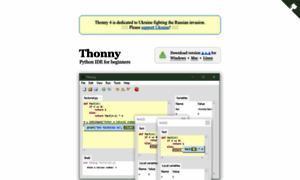
Once Thonny is open, we want to create a Python file for today's lab and save it in the lab01 folder on your desktop. Step 0) On your computer, using Spotlight, find and open Thonny.
Conditionals in thonny software#
Print(f"Your number is greater or equal to. Tip: To download Thonny on your personal computer at home, see the Software section of this website (Reference > Software). User_input = int(input("Please, enter a number: ")) Python language offers some special types of operators like the identity operator and the membership operator. The code in question is shown below: LIMIT_NUMBER: int = 10 value is mile which is a float and it just assigns miles to value 4. That said, as you are in an elif, itll only run if the value is more than 300 anyway, so its pointless to check again. However, for some reason, when this number is entered, the interpreter skips this statement and outputs the message equivalent to the input being greater than or equal to the LIMIT NUMBER. As another note, Python supports 3-item comparisons, so you can do, for example, elif 300 < mile < 2000: to simplify your code. The former usually starts with the word if and sets out a condition, while the latter expresses what happens when this condition is fulfilled. They are made up of two clauses the conditional clause and the main clause.

print () is a function in Python 3 so I assumed you are using Python 3. print is a statement instead of a function. The problem starts when the input is equal to 12 my intention is to display a message indicating that the number 12 was entered. Conditionals are if clauses: they express a situation or condition and its possible result. input in Python 2 will tries to interpret the input as Python code. The program works well if the input is greater than or equal to the LIMIT NUMBER or if the input is less than the LIMIT NUMBER.

An 'if statement' is written by using the if keyword.
I'm practicing with a code snippet that sends a message depending on user input my question is about the elif conditional. Python supports the usual logical conditions from mathematics: Equals: a b Not Equals: a b Less than: a < b Less than or equal to: a < b Greater than: a > b Greater than or equal to: a > b These conditions can be used in several ways, most commonly in 'if statements' and loops.Now let us discuss each of the loop types in the following sections.
Conditionals in thonny update#
And update the iterator/ the value on which the condition is checked. If True, execute the body of the block under it. Advanced way to check the exact word, that we need to find in a long string: import re text 'This text was of edited by Rock' try this string also text 'This text was officially edited by Rock' for m in re.finditer (r'bofb', text): if m.group (0): print ('Present') else: print ('Absent') Share.

I'm in the lesson about conditionals, and I've come across something that has left me a little confused. Both of them work by following the below steps: 1. I recently started re-learning Python (I love it too much!).


 0 kommentar(er)
0 kommentar(er)
